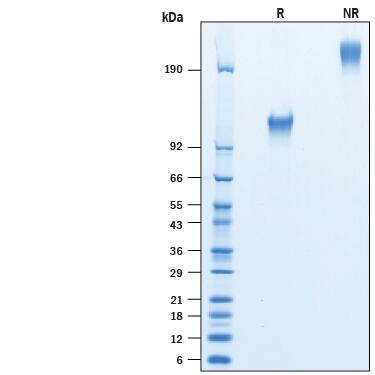Recombinant Human CD30/TNFRSF8 Fc Avi-tag Protein, CF
R&D Systems, part of Bio-Techne | Catalog # AVI10240
Biotinylated

Key Product Details
Learn more about Avi-tag Biotinylated Proteins
Source
HEK293
Accession #
Structure / Form
Disulfide-linked homodimer, biotinylated via Avi-tag
Conjugate
Biotin
Applications
Bioactivity
Product Specifications
Source
Human embryonic kidney cell, HEK293-derived human CD30/TNFRSF8 protein
| Human CD30/TNFRSF8 (Phe19-Lys379) Accession # P28908.1 |
IEGRMD | Human IgG1 (Pro100-Lys330) |
Avi-tag |
| N-terminus | C-terminus | ||
Purity
>95%, by SDS-PAGE visualized with Silver Staining and quantitative densitometry by Coomassie® Blue Staining.
Endotoxin Level
<0.10 EU per 1 μg of the protein by the LAL method.
N-terminal Sequence Analysis
Phe19
Predicted Molecular Mass
67 kDa
SDS-PAGE
107-127 kDa, under reducing conditions
Activity
Measured by its binding ability in a functional ELISA.
When Recombinant Human CD30 Ligand/TNFSF8 (Catalog # 1028-CL) is immobilized at 0.25 μg/mL (100 μL/well), the concentration of Biotinylated Recombinant Human CD30/TNFRSF8 Fc Chimera Avi-tag (Catalog # AVI10240) that produces 50% of the optimal binding response is 3-15 ng/mL.
When Recombinant Human CD30 Ligand/TNFSF8 (Catalog # 1028-CL) is immobilized at 0.25 μg/mL (100 μL/well), the concentration of Biotinylated Recombinant Human CD30/TNFRSF8 Fc Chimera Avi-tag (Catalog # AVI10240) that produces 50% of the optimal binding response is 3-15 ng/mL.
Scientific Data Images for Recombinant Human CD30/TNFRSF8 Fc Avi-tag Protein, CF
Recombinant Human CD30/TNFRSF8 Fc Avi-tag Protein Binding Activity
When Recombinant Human CD30 Ligand/TNFSF8 (Catalog # 1028-CL) is immobilized at 0.25 µg/mL,100 µL/well, it binds Biotinylated Recombinant Human CD30/TNFRSF8 Fc Chimera Avi-tag (Catalog # AVI10240) with an ED50 of 3-15 ng/mL.Recombinant Human CD30/TNFRSF8 Fc Avi-tag Protein SDS-PAGE
2 μg/lane of Recombinant Human CD30/TNFRSF8 Fc Chimera Avi-tag (Catalog # AVI 10240) was resolved with SDS-PAGE under reducing (R) and non-reducing (NR) conditions and visualized by Coomassie® Blue staining, showing bands at 107-127 kDa and 210-250 kDa, respectively.Formulation, Preparation and Storage
AVI10240
| Formulation | Lyophilized from a 0.2 μm filtered solution in PBS with Trehalose. |
| Reconstitution | Reconstitute at 500 μg/mL in PBS. |
| Shipping | The product is shipped at ambient temperature. Upon receipt, store it immediately at the temperature recommended below. |
| Stability & Storage | Use a manual defrost freezer and avoid repeated freeze-thaw cycles.
|
Background: CD30/TNFRSF8
References
- Kennedy, M.K. et al. (2006) Immunology 118:143.
- Tarkowski, M. (2003) Curr. Opin. Hematol. 10:267.
- Durkop, H. et al. (1992) Cell 68:421.
- Hamann, D. et al. (1996) J. Immunol. 156:1387.
- Shanebeck, S.D. et al. (1995) Eur. J. Immunol. 25:2147.
- Gruss, H.-J. et al. (1994) Blood 83:2045.
- Oflzoglu E. et al. (2009) Adv. Exp. Med. Biol. 647:174.
- Del Prete, G. et al. (1995) J. Exp. Med. 182:1655.
- Harlin, H. et al. (2002) J. Immunol. 169:2451.
- Amakawa, R. et al. (1996) Cell 84:551.
- Chiarle, R. et al. (1999) J. Immunol. 163:194.
- Vinante, F. et al. (2002) Blood 99:52.
- Hansen, H.P. et al. (1995) Int. J. Cancer 63:750.
- Hansen, H.P. et al. (2000) J. Immunol. 165:6703.
- Hargreaves, P.G. and A. Al-Shamkhani (2002) Eur. J. Immunol. 32:163.
Alternate Names
CD30, TNFRSF8
Gene Symbol
TNFRSF8
UniProt
Additional CD30/TNFRSF8 Products
Product Documents for Recombinant Human CD30/TNFRSF8 Fc Avi-tag Protein, CF
Product Specific Notices for Recombinant Human CD30/TNFRSF8 Fc Avi-tag Protein, CF
For research use only
